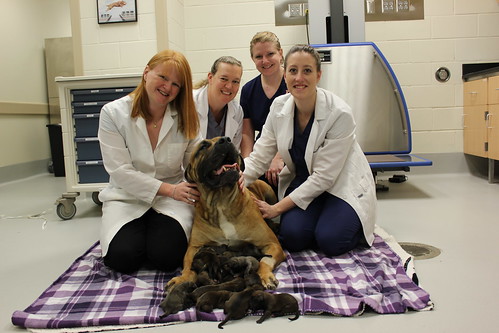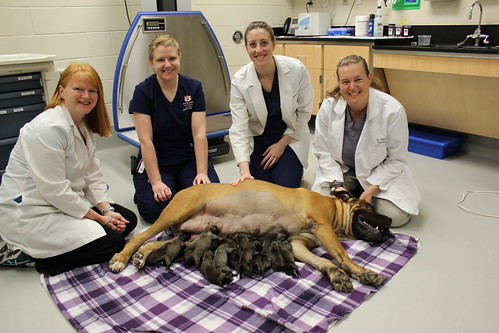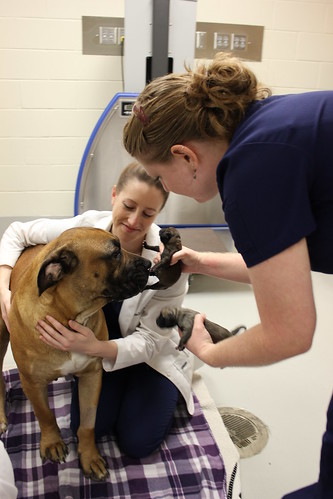African boerboel delivers 19 puppies at Auburn’s College of Veterinary Medicine
Article body
Bailey, a four-year-old African Boerboel, recently delivered what is believed to be the largest litter of puppies – 19 – ever born at the Auburn University College of Veterinary Medicine.
All but one of the puppies survived the April 28 caesarean delivery by a multidisciplinary team of faculty veterinarians at the Wilford and Kate Bailey Small Animal Teaching Hospital. Guinness World Records reports the largest litter is 24 puppies, born in 2004.
The teaching hospital's Theriogenology (reproduction) Service provided medical assistance and care for Bailey throughout her pregnancy, including a transcervical insemination, pregnancy care and delivery.
Dr. Aime Johnson, an associate professor and theriogenologist who worked with Bailey and her owners, Jerry and Angie Turner of Dothan, recommended a caesarean birth following a radiograph which determined a larger than normal litter.
"The radiograph showed at least 14 to 15 puppies, so we decided on a C-section because a natural birth for a litter that size would be a long delivery for the mother and often results in the loss of puppies because of the long delivery process," she said.
All of the puppies and mom are thriving with owners. Until a week ago, Bailey and the puppies stayed with a nanny to assist with the every-four-hour feedings for the puppies.
The Turners, who own Hidden Creek Boerboels in Dothan, decided to use Auburn's small animal theriogenology service to impregnate Bailey and follow her pregnancy. The father, an impressive male named Afrika Marcos, or Mayhem for short, is also owned by the Turners.
Auburn is one of four veterinary medical programs in the U.S., and the only one in the South, to receive funding to establish the American Kennel Club, or AKC, Residency in Theriogenology, which enhances Auburn's national reputation in theriogenology, or reproductive medicine, in both large and small animal medicine. Auburn has been twice funded by the AKC and the Theriogenology Foundation for a resident position.
"We originally started about a year ago bringing the dogs for a progesterone test to find the fertile window to breed," said Turner, who has 10 dogs in his kennel.
"With Bailey, we started with the transcervical insemination, and when radiographs showed Bailey was to have a large litter, we opted for a C-section," Turner added.
"They were all just super, great to work with, very knowledgeable and a blessing to our kennel," Turner said, adding that he has sold the breed to owners across the U.S. and Puerto Rico.
Not a well-known breed in Alabama, the Boerboel is an impressive dog and is recognized as being intelligent, reliable and obedient with a strong watchdog instinct. "The most common thing we hear from our customers is that the Boerboel is the best dog we've ever owned, and we have several return customers," Turner said.
"We have been blessed to be able to own some of the top Boerboels in North America, and we've been very pleased with the Theriogenology Service at Auburn," Turner said. "With the wonderful dogs we have been able to acquire and produce, we feel quite fortunate."
Related Media
Media interested in this story can contact Communications Director Preston Sparks at (334) 844-9999 or preston.sparks@auburn.edu.
Auburn University is a nationally ranked land grant institution recognized for its commitment to world-class scholarship, interdisciplinary research with an elite, top-tier Carnegie R1 classification, life-changing outreach with Carnegie’s Community Engagement designation and an undergraduate education experience second to none. Auburn is home to more than 30,000 students, and its faculty and research partners collaborate to develop and deliver meaningful scholarship, science and technology-based advancements that meet pressing regional, national and global needs. Auburn’s commitment to active student engagement, professional success and public/private partnership drives a growing reputation for outreach and extension that delivers broad economic, health and societal impact.







